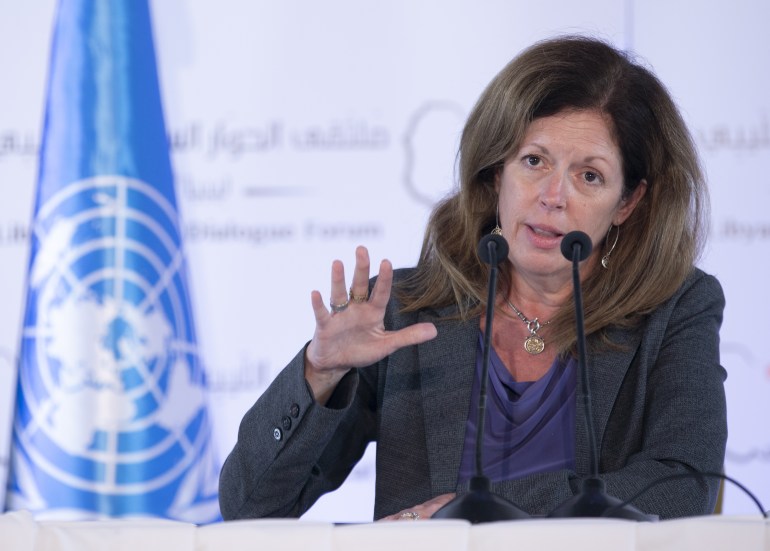The option of postponing the elections in Libya is looming on the horizon, with Libyan officials repeatedly saying that it is difficult to adhere to the December 24 date to organize the presidential vote, while the United Nations is making efforts with the Libyan parties to save the electoral process.
Yesterday, Wednesday, the Chairman of the Internal Affairs Committee in the Libyan House of Representatives, Suleiman Al-Harari, called on the members of the House and the High Electoral Commission to assume their responsibilities and announce the inability to hold the elections on the specified date.
A source from the Electoral Commission told the island that the commission had submitted a report to the House of Representatives that included legal and technical obstacles and difficulties facing the conduct of presidential elections.
The source added that the commission demanded in its report the amendment of the electoral laws and the issuance of a regulation for the work of the appeals committee related to the electoral process.
And earlier yesterday, Wednesday, the head of the Supreme Council of State in Libya, Khaled Al-Mashri, said that the reason for the blockage in the electoral process is the laws issued by the Presidency of the House of Representatives and the Supreme Judicial Council, which issued regulations in violation of the legislation regulating the work of the Council, as he put it.
About a week ago, the Supreme Council of State presented an initiative calling for postponing the elections and holding them next February, and achieving the constitutional entitlement, provided that the parliamentary elections are in accordance with the General National Congress election law, and the presidential elections are held according to the list system consisting of a president, two deputies and a prime minister, in addition to the The initiative proposes that the term of office of the President and the House of Representatives be 4 years for one non-renewable term.
In an interview with Al-Jazeera two weeks ago, the head of the Libyan Electoral Commission, Imad al-Sayeh, indicated the possibility of postponing the presidential elections.
The Supreme Council of State and Libyan political forces oppose the holding of elections in the absence of a constitutional basis, and the electoral laws approved by the House of Representatives weeks ago sparked criticism from several parties, who consider that they were separated according to certain personalities, especially retired Major General Khalifa Haftar.
Dozens were nominated for the presidential elections, including Saif al-Islam Gaddafi and Khalifa Haftar, and according to the House of Representatives, parliamentary elections are supposed to take place 30 days after the presidential elections.
Williams called for respect for the demand of the Libyan people to hold elections (Anadolu Agency)
international endeavors
While doubts are growing that the elections will be organized on time, the Special Adviser to the Secretary-General of the United Nations on Libya Stephanie Williams is racing against time to save the electoral process.
Williams met a number of political and military leaders in Libya and then announced that her mission is to support the electoral process.
During her meeting with the head of the Supreme Council of State, Khaled Al-Mashri, the UN official stressed the need to respect the demand of the Libyan people to hold free and fair elections.
In a separate meeting with a member of the Presidential Council, Abdullah Al-Lafi, Williams said that her mission in Libya is to lead the three Libyan political, economic and military tracks, in addition to supporting the electoral process.
From the city of Misurata, the Special Adviser to the Secretary-General of the United Nations stressed that the United Nations strongly supports the desire of the Libyan people to hold free and credible elections.
In Ankara, the designated Speaker of the Libyan House of Representatives, Fawzi Al-Nuwari, discussed with Turkish President Recep Tayyip Erdogan the Libyan crisis, stopping foreign interference in Libyan affairs, and ways to achieve security and stability in Libya and the region.
Al-Nuairi and the accompanying parliamentary delegation discussed with Erdogan the bilateral relations between the two countries, and ways to enhance joint cooperation at all levels to serve the interests of the Libyan and Turkish peoples.
Sabha witnessed clashes between the anti-terror forces of the Presidential Council and Haftar's forces (Al-Jazeera)
security tension
In the meantime, the Libyan capital, Tripoli, is witnessing security tension against the backdrop of the Presidential Council's dismissal of the commander of the Tripoli Military Region, Abdel Baset Marwan, and the assignment of Major General Abdel Qader Khalifa as his successor.
Security brigades affiliated with the Tripoli Military District deployed a number of their vehicles in the vicinity of the Prime Ministry and a number of government institutions in protest against the decision of the Presidential Council.
On the other hand, local sources told Al Jazeera from the city of Sebha (southern Libya) that cargo planes belonging to the forces of retired Major General Khalifa Haftar arrived yesterday, Wednesday, at Tamanhint Air Base near the city, carrying heavy and medium weapons and armed men.
Those sources said that the closure of Sebha University and most of the schools continues for fear of renewed clashes between the anti-terrorist forces of the Presidential Council and Haftar's forces.
The sources added that a state of cautious calm prevails in the city, whose main streets are witnessing a military deployment from both sides, following recent clashes.

